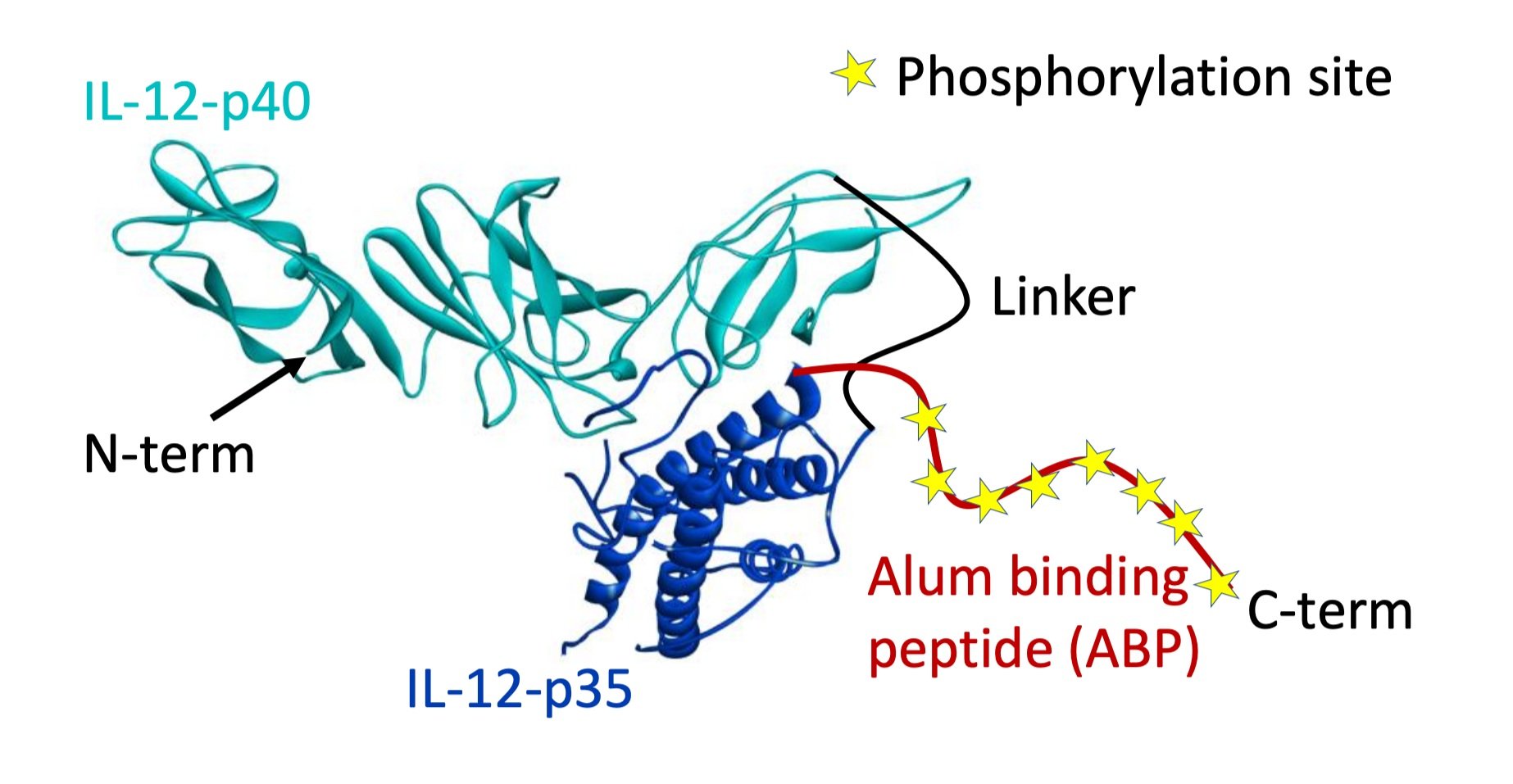
Redefining Pet Cancer Care
JEN-101: A New Frontier in Targeted Therapy
Jenga is proud to introduce JEN-101, a pioneering therapy in the battle against canine oral melanoma and possibly other solid tumors. Traditional cytokine immunotherapies have shown efficacy in activating the immune system against cancer but are often marred by severe autoimmune responses, curbing their widespread application. JEN-101 circumvents these challenges by ingeniously blending the canine-derived cytokine interleukin-12 (IL-12) with aluminum hydroxide. This novel approach anchors IL-12 directly to the collagen within solid tumors, focusing the response where it is needed most. The effectiveness of JEN-101 is largely attributed to its aluminum hydroxide anchor, which localizes the treatment within the tumor, preventing the extensive immune reactions associated with other cytokine immunotherapies. Despite the systemic autoimmune response, early studies suggest that anchored IL-12 still “teaches” the immune system to recognize cancer cells as pathogenic. This is indicated by studies showing a clear reduction in tumor size, both at the site of treatment and in distant tumors, as evidenced by decreased tumor volume and increased white blood cell infiltration.
Study Insights and Effectiveness
Under the leadership of Dr. Tim Fan at the University of Illinois, early trials in dogs have showcased JEN-101's safety and effectiveness against advanced oral melanoma. These findings reinforce Jenga's mission to improve cutting-edge cancer treatments, underscoring our commitment to developing innovative solutions that promise a healthier future for all pets.
Envisioning a Future Where Pets Thrive
Jenga's mission transcends merely treating cancer; we aim to fundamentally transform veterinary oncology. By making groundbreaking therapies like JEN-101 widely available, we are striving towards a future where cancer no longer shortens the lives of our four-legged friends.
Impact of Four JEN-101 Injections Over 84 Days on Canine Melanoma
Honoring Canine Contributions To Cancer Research
At Jenga, we recognize dogs as more than companions—they are key allies in cancer research. Their unique position as natural models offers insights unmatched by traditional laboratory animals. Sharing our environments, dogs develop similar types of cancers, progressing in ways that closely resemble those in humans. Their faster aging process accelerates research timelines, making them invaluable for advancing oncology.
In light of the cutting-edge research already achieved using canine models, Jenga is dedicated to ensuring these contributions translate directly into advancements in canine healthcare. We are committed to developing state-of-the-art therapies like JEN-101 for dogs, inspired by their human counterparts like ANK-101, with the same level of rigor and innovation. This commitment extends to partnering with leading research institutions and pharmaceutical companies to leverage existing canine studies, ensuring that our canine friends benefit from the latest oncological breakthroughs alongside humans.
This approach highlights our belief in the mutual benefits of canine and human oncology research. By acknowledging the profound contributions of dogs to this field, Jenga aims to not only advance cancer treatment for all dogs but also to give back to our four-legged partners in research. Ensuring dogs have access to the latest therapeutic innovations as swiftly as humans is our way of honoring their role in our shared journey towards conquering cancer, showcasing our dedication to their well-being and the invaluable insights they provide.
JEN-101: Structural Insights
Explore The Science
JEN-101 Preclinical Study Supports Safety and Potential Systemic Activity in Canine Melanoma
A new study published in Molecular Cancer Therapeutics suggests the safety and promising activity of JEN-101 (Jenga's anchored canine IL-12) for treating advanced melanoma in dogs. Intratumoral administration of JEN-101 appears generally well-tolerated, with manageable side effects observed. The study indicates that JEN-101 may trigger both local and systemic anti-tumor immune responses, with evidence of immune activation even in distant, untreated tumors, suggesting the treatment might help the immune system identify cancer cells throughout the body, even in areas not directly treated. Meaningfully, the study also showed objective tumor reduction in a subset of dogs, an encouraging finding in this early research phase, supporting further investigation of JEN-101. This reinforces the value of comparative oncology in advancing cancer therapeutics.
Read More
Comparative Immunotherapy: Advancing Cancer Treatment with Canine Models
This article published in The Journal of the American Veterinary Medical Association highlights how pet dogs, with their biological similarities to humans, are advancing cancer immunotherapy for both species. It explores promising treatments shared between humans and dogs, including immune checkpoint inhibitors, cancer vaccines, adoptive cell therapy, and cytokine therapies, emphasizing the shared benefits of this comparative approach.
JEN-101 in Dogs: Promising Treatment for Melanoma
Learn more about our JEN-101 (formerly known as cANK-101) Pilot Study
Read more about our breakthroughs and the implications of JEN-101 in veterinary oncology in this article published in the American Journal of Veterinary Research
JEN-101’s Foundation: Localizing Cytokine Therapy with Collagen Anchoring (2019)
At the heart of one of Jenga's therapeutic strategies is a groundbreaking 2019 study from MIT published in Science Translational Medicine. This research addresses the primary limitation of cytokine-based immunotherapies—systemic exposure. By anchoring cytokines to collagen, which is prevalent in many solid tumors, the technology localizes treatment precisely within the tumor environment. This method significantly reduces side effects and improves outcomes by utilizing the body's immune system to specifically target and destroy cancer cells, while minimizing its reaction to healthy cells.
Improving Drug Retention: Enhancing IL-12 Anchoring with Aluminum-Hydroxide
Building on the 2019 breakthrough, this 2022 MIT study advances localization techniques by employing alum to anchor interleukin-12 (IL-12) within tumors, making ANK-101 as we know it today. This development significantly enhances the efficacy of IL-12 therapy, focusing its potent anti-tumor effects directly at the tumor site and markedly reducing systemic side effects. This innovation symbolizes a refined approach to immunotherapy, highlighting precision and patient safety in targeted cancer treatment. The utilization of IL-12 in this manner underscores a pivotal shift towards more effective, localized treatments, offering new hope for patients through a strategy that mitigates the traditional challenges associated with systemic immunotherapy."
Systemic Breakthrough: mANK-101 Triggers Global Immune Response, Targeting Distant Tumors
This study suggests JEN-101’s mouse precursor (mANK-101) has the ability to not only reduce the size of tumors at the injected tumor, but also in causing regression in distant, untreated tumors. This study supports the idea that the anchored IL-12 technology in JEN-101 teaches the immune system to to target cancerous cells while crucially avoiding the systemic autoimmune damage typically associated with traditional cytokine treatments.








